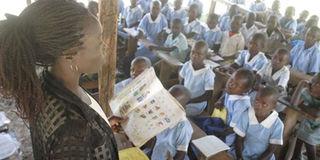Today's teacher has been forced to be a bit of a warrior

A teacher with students at a primary school. PHOTO | TOM OTIENO | NATION MEDIA GROUP
What you need to know:
The making of the super-teacher will not occur automatically, overnight, or over a week-long seminar.
Teachers will need thorough retraining and the resources necessary to help them adapt to their future roles.
Most of all, they will need parents and society to cooperate with them in modelling values that will impact the lives of our children and our nation positively.
I recently received a short note on Facebook from my high school woodwork teacher, Ms Maina. She was making contact for the first time in 34 years.
This dedicated teacher taught me woodwork in my first two years of high school, a skill I have carried throughout my life. My first project was a chapati set – a board and rolling pin that my mother used for many years. Now Ms Maina lives and teaches in the US. What a loss for hundreds of Kenyan students, I thought.
Hearing from Ms Maina opened a floodgate of memories, memories of my teachers in primary and high school and the esteem in which a teacher was held.
A teacher was never wrong. Never! If your teacher said two plus two equalled three, you took notes without comment. The role of the teacher was to impart knowledge and that of the student was to soak it up like a new sponge. Hence, the tools of the teacher were simple ones: a classroom of students, a textbook, a blackboard, and chalk.
Save for the more practical classes, such as woodwork, a lesson was more like dictation, less like a discussion. At the end of each lesson the teacher would invariably ask, “Does anyone have any question?”. This was not an invitation for anyone to dispute the knowledge that the teacher had imparted, but rather an opportunity for any slow student who had not understood to receive clarification. Not wanting to be perceived as the class dunderhead, we avoided asking questions. “Good,” the satisfied teacher would declare, shutting his or her book resolutely and leaving the prefect to erase the board.
A WARRIOR
The teacher of the past has morphed into the teacher of today who, besides imparting knowledge, has been forced to be a bit of a warrior, boycotting the classroom and taking to the streets now and then to fight for fair pay.
Additionally, today’s teacher must play multiple roles, taking over where society and family have failed. So today we have the teacher-mother, who must be in school extra early to receive the children who are dropped off at sunrise and remain late after school to keep company those who are picked up after sunset.
Many a teacher has taken home with them a child who was forgotten altogether. The teacher-mother is sometimes responsible for feeding a child who might otherwise go hungry all day, not due to neglect, but simply because there is nothing to eat at home.
The teacher-counsellor takes care of the psychological wellbeing of children. She may be the first to notice that a child who has been happy and active in the past is now silent and distracted. So she makes a mental note to talk to the child during break. He or she will be the one to notice that a child is angry, acting up. His parents are getting a divorce and he does not know why his world is falling apart.
The teacher-role model must always keep in mind that dozens of children are looking up to her or him for an example. She or he must remember as she or he chooses her or his attire in the morning that hundreds of children will be watching. And he or she must recall that every remark he or she makes might play a part in forming the attitude and values of a child.
PAST ROLES
Kenya’s teacher of tomorrow will combine the past roles, the present ones, and much more – a sort of super-teacher. The change to a competency-based curriculum means that teachers will no longer be imparting information for regurgitation in an exam. Instead, the super-teacher will be more of a facilitator, a director of students in the learning process. The teacher of tomorrow will be more concerned with organising teamwork, managing classroom activity, and supporting individual learners to realise their full potential. They will be facilitators of students as they “learn to be” through the acquisition of skills, competencies, and qualifications necessary for success in the 21st century.
The new curriculum also calls for modelling of attitudes. The super-teacher must, therefore, have the right attitude – towards the country, the opposite gender, other Kenyans, and other races. The super-teacher must abhor corruption if she or he is to be a model character for her students.
The making of the super-teacher will not occur automatically, overnight, or over a week-long seminar. Teachers will need thorough retraining and the resources necessary to help them adapt to their future roles. Most of all, they will need parents and society to cooperate with them in modelling values that will impact the lives of our children and our nation positively.
Teachers, what you do matters. Hats off to you.
David Waweru is the chief executive officer of WordAlive Publishers.




